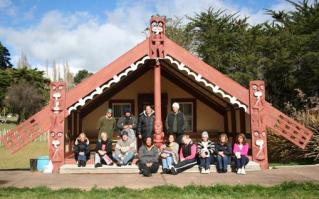Section navigation

This clip explores the benefits (for all) of having a genuine partnership between school, students, and whānau/iwi. We hear the perspectives of the principal, a Board of Trustees member, a teacher, two Te Kauhua facilitators, and a parent. They discuss the increased confidence of Māori students, due to both whānau/iwi input and the recognition of local knowledge. They also emphasise the importance of experiences on the marae, where teachers can listen to the aspirations of whānau and jointly set goals, giving effect to the principle of ‘tino rangatiratanga’.
Questions / Things to think about / Activities
- The New Zealand Curriculum requires schools to ‘make decisions about how to give effect to the national curriculum in ways that best address the particular needs, interests, and circumstances of the school’s students and community’ (NZC p37). How can we create more productive partnerships, so that we are working together with the students and their whānau to get a clear understanding of their values and expectations, in order to produce better outcomes?
- Ka Hikitia, the Ministry's Māori education strategy, states that parents and whānau play a critical role in supporting their children's learning. The New Zealand Curriculum wants schools to ensure that ‘the curriculum has meaning for students, connects with their wider lives, and engages the support of their families, whānau, and communities’ (NZC p9). How can we increase whānau involvement at our school, so that whānau are genuinely valued as partners?
- Biddulph et al (2003) reported that it was sustained parental involvement, focused on learning activities/tasks, that improved children's level of achievement, not simply parents being on a school board/committee. What is happening in our school to ensure genuine partnership and real, lasting change?
- How can our school demonstrate to whānau a genuine willingness to establish an equal partnership that values the respective strengths of each partner, while working together to achieve shared goals?
- What mechanisms do we use to show that ‘culture counts’, to find out where students come from, what they know, and how they know what they know?
- The New Zealand Curriculum provides the flexibility for teachers to use local content/contexts in their teaching. What can we do to tailor the content of teaching and learning experiences to ensure relevance for our Māori learners?
Filed under: Productive partnerships | Identity Language and Culture | Effective leaders





